What is it like to move from a lucrative (but uninspiring) “stable” career to the unknowns of remote freelancing and content creation in your 40s? SCARY! Here’s how Susan Portnoy did it.
In this conversation we discuss Susan’s various career transitions in her 40s (some of which were perhaps counterintuitive but soul-satisfying), remote work pitfalls and productivity tips like online co-working, and some great financial advice for remote freelancers and aspiring entrepreneurs.
Related Interviews to Check Out:
Being a Remote Employee vs. Remote Entrepreneur with Victoria Puzach
Can You Pay $0 in Digital Nomad Taxes? Let’s Ask Kathleen Di Paolo, Wanderers Wealth
Being an Online Translator and Remote Freelancer, With Isabelle Paccault
What is Solo Travel Over 50 Like? With Janice Waugh of Solo Traveler
Jump right into my Awesome Interview Series videos on YouTube here – and please give it a thumbs up, leave comments and subscribe!
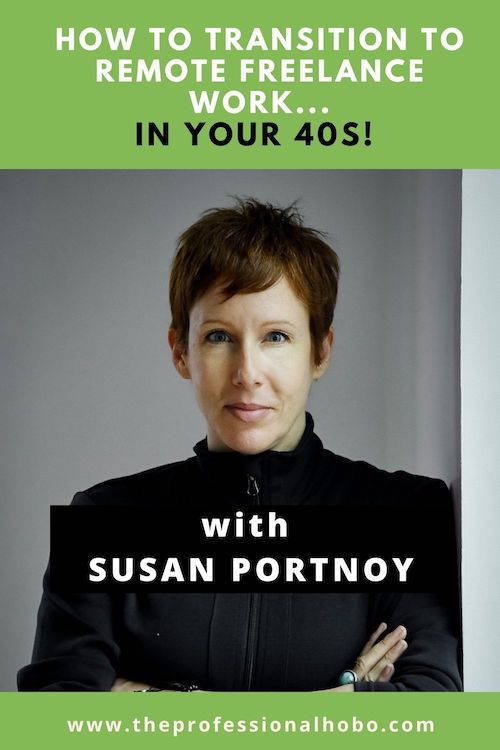
Introducing Susan Portnoy, The Insatiable Traveler
Once a high-powered Communications and PR professional in Manhattan, Susan Portnoy left her successful career in 2018 to focus on her website The Insatiable Traveler, as well as freelance travel photography, writing, and content creation.
As a freelance writer and photographer, her work has appeared in Newsweek, Travel Weekly, Adventure.com, AFAR, Wendy Perrin, WashingtonPost.com, NatGeo.com, and US News & World Report, among other publications.
This year, she was named “Photographer of the Year” by the prestigious SATW Bill Muster Awards and has won multiple Lowell Thomas Awards (the Oscars of travel) for “Photo Depiction of Travel.”
The Insatiable Traveler is for adventurers of any age who see exploring new destinations as more than a dry martini poolside. Susan’s images and tales transport, immerse, and excite readers, encouraging them to embrace adventure (however they define it) and connect with the people and places they visit, personally and through their photography. The Insatiable traveler is rife with practical information to help make every trip a trip of a lifetime.
Watch Our Chat Here!
I apologize for the sound quality of this interview; Susan’s microphone wasn’t working properly, and try as we may we couldn’t figure out how to fix it. Hopefully the content will be riveting enough to overcome this technical challenge and sacrifice in quality.
Click here to view it on YouTube, or watch below!
Susan’s Various Career Transitions
Susan has experienced the freelance hustle on and off throughout her career, but she wasn’t always in the travel writing / travel photography / content creation fields. In fact, she started in the fashion industry, working in sales for a small firm. Being an integral part of a small team allowed Susan to wear a few hats, and eventually she realized where she really excelled was in doing PR (public relations).
This was where she learned the biz and cut her teeth, before moving to Conde Nast Traveler where she was the VP of Corporate Communications. It was a multi-faceted job that she enjoyed, and was also her introduction to the travel industry. Unfortunately, she got laid off (which is of course the down-side to working for somebody else; people think of being an employee as having “stability”, when it can actually be quite the opposite)!
She went to interviews for PR jobs, but she actually felt ill every time she interviewed, which led to her realizing her heart really wasn’t in it.
See also: How to Change Your Career in a Changing World
Susan had been dabbling in freelance travel writing and photography, which she adored. But changing careers and going out on her own entrepreneurially in her 40s was a terrifying transition. She felt caught between a lucrative career that didn’t make her happy and a freelance career that fulfilled her but was full of unknowns.
But she also realized that making a career change away from PR didn’t have to be a life sentence; she could return to this kind of work if she needed or wanted to.
(Nora’s Note: Susan’s story resonates with me so much. When I got out of the (lucrative) financial planning biz in 2006, I did so without burning any bridges, and with the full knowledge that I could return to the industry at any time.)
With this perspective, Susan decided to invest and go all-in with remote freelance work as a travel blogger, content creator, photographer, and freelance writer. The relief she immediately felt upon making this decision was confirmation that she did the right thing.
This was in 2018. Susan had a lot of relatively immediate success throughout 2019, but the pandemic put the kibosh on all her travel-related projects. Thing is, the PR industry has changed in the years since she last worked in it full-time, and returning to it would be an uphill battle; instead of beating Susan down, this gives her even more motivation to make her current career work!
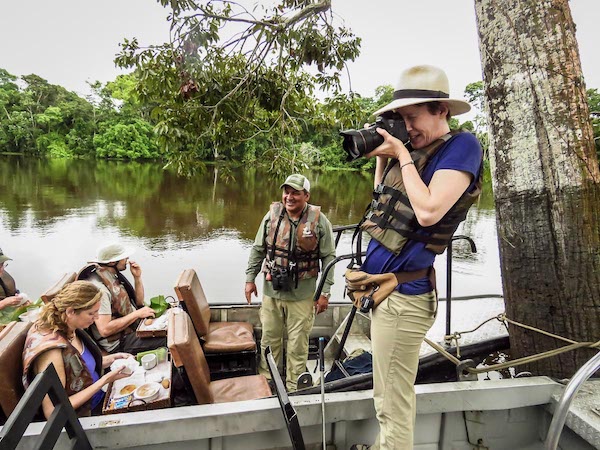
Lessons Learned in the Remote Freelance Biz
We dove into a ton of practical tips and coping mechanisms for the challenges of remote freelance work touching on the following topics and points:
- The freelance hustle, and how exhausting the feast or famine element can be.
- Recognizing when it’s time to change tack and move to more of an entrepreneurial model.
- The myriad of things Susan learned the hard way in going out on her own and becoming a content creator (eg: SEO).
- Remote work productivity pitfalls.
- Juggling the different elements of her remote freelance career (writing, photography, blogging, etc.).
- What it’s like to be somebody who thrives on work deadlines and no longer has any.
- When there’s always something you could do but nothing you must do, what do you do??
- Parkinson’s Law: your work will expand to fill the time you give it – and how to combat this productivity pitfall.
- Dealing with online distractions that we pretend are work but aren’t really.
- The irony of being an introvert pre-pandemic, then having it forced on her with COVID.
- How hard it can be to give ourselves permission to take a break, and the irony of how that time away can actually make our work more focused and productive.
Online CoWorking as a Solution to Remote Freelance Work Challenges
When asked about the comparison between her job in PR and her remote freelance work, she immediately honed in on missing the sense of community and camaraderie that comes with having office colleagues; the ability to walk by a colleague’s desk and bat some ideas around is helpful socially, creatively, and can even help with productivity and work-life balance.
So I asked her about her coping mechanisms for the loss of office colleagues, and she had two major suggestions.
ONE: Go out for a walk. It makes her feel like she’s part of the world, and it’s also a great way to clear her head and foster the creative process.
TWO: Online CoWorking. Freelancers in general are lone wolves, and it’s important to develop some kind of community. For Susan Portnoy, online co-working is part mastermind group, part accountability, and part social. It also provides focused work sessions, which for some people (especially throughout the pandemic) can be problematic to replicate when working entirely alone.
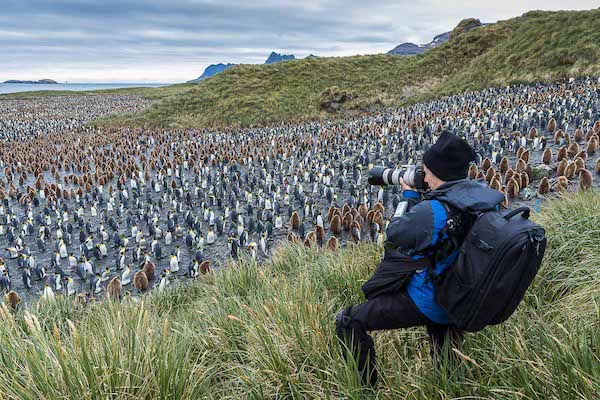
Financial Planning and Tax Advice for Remote Freelancers
Susan’s savvy financial habits saved her while living in New York City during COVID, when all her work disappeared and the travel industry tanked. Here is some of her advice:
See also: Filing Taxes for Digital Nomads
- As soon as a cheque comes in, transfer a percentage into a separate savings account for taxes
- The same goes for other types of savings and expenses – transfer that out first; you’ll spend (or make due) with the rest
- ALWAYS pay off credit cards in full!
- Live beneath your means (Susan Portnoy was lucky to have a frugal upbringing)
Advice for Aspiring Remote Freelancers
Susan Portnoy offered a lot of really practical advice based on her experience as a freelancer. If I didn’t know any better, I’d have said she was freelancing a whole lot longer than she has been!
- Freelancing isn’t free! Invest in the foundation of your business.
- Go to conferences and network.
- Take a strategic look at decisions and necessities along the way.
- Set up as many templates as possible to reduce redundant tasks.
- The importance of mindset, and understanding that fundamentally it will change along the way as circumstances do.
- For those in the travel industry, it’s important to recognize the importance of having travel experiences for personal reasons in addition to work-trips.
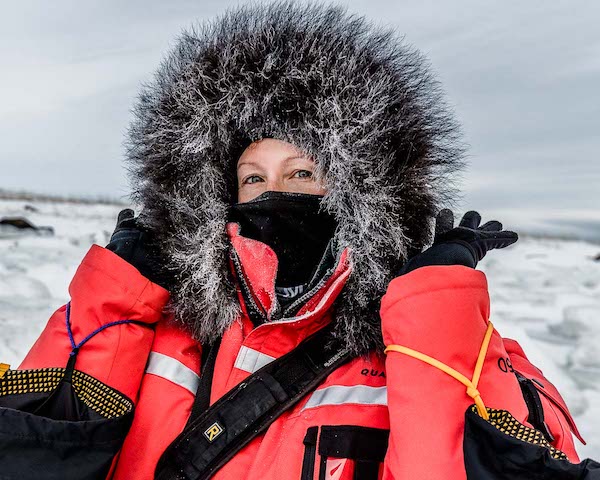
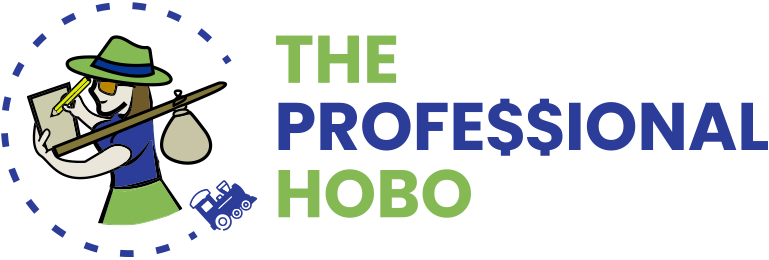
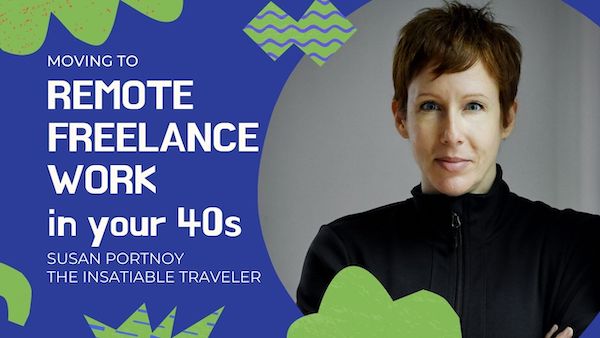

Timely! At the tail end of my 40s and my goal is to take myself from budding side hustle to full time remote work in two years.
Awesome! Hope you got some inspiration and advice from this interview with Susan.